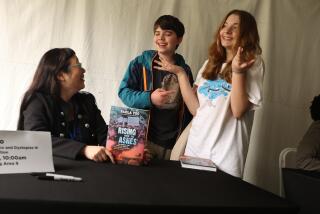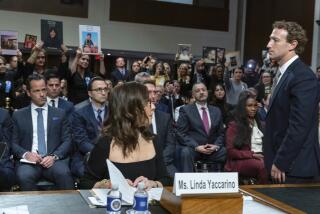Festival of Books: How hashtags become powerful tools of social change
Social media has power; power to stop deportations and to spark a human rights and racial justice movement.
At the Los Angeles Times Festival of Books panel “Hashtivism: Activism in the Hashtag Age” on Saturday, panelists noted the power social media wields when it comes to motivating change and the misconceptions people have about its use.
The panel is the first one hosted by #EmergingUS, a digital magazine that will launch in about two and a half months, focused on race, immigration and identity in a multicultural America. The panel was moderated by Jose Antonio Vargas, founder and editor of #EmergingUS.
FULL COVERAGE: FESTIVAL OF BOOKS
Erika Andiola, co-director for DRM Action Coalition, shared with audience members the story of the night her mother was taken by U.S. Immigration and Customs Enforcement.
One of the first things she did was go to Facebook and let her friends know that ICE had taken her mom. Later, when she shared a Youtube video regarding what happened -- using #notonemore and #weareandiola -- she received about 60,000 views in a matter of 12 hours. Her mom was taken at 9 p.m. and she came back at 9 a.m.
“I was able to launch this pretty amazing campaign with my community to stop my mom’s deportation, thanks to social media,” Andiola said. “If that’s not power of using that tool of social media, I don’t know what is … I can tell you that it has changed many lives, not just mine.”
For Patrisse Cullors, director of Power Dignity and co-founder of #BlackLivesMatter, it was important to note the misconception people have that activists utilizing social media don’t have a strategy. When she helped create #BlackLivesMatter, it was well thought out.
“In large part, people are thinking about the strategy and how it’s going to be utilized – the politic behind the hashtag,” Cullors said. “There are reasons and organization around it that gets misunderstood often.”
Cullors explained the story behind the #BlackLivesMatter, and the fact that the hashtag was never just about the killing of young black men, but “really a broader conversation around anti-black racism within this country.”
Social media allows people to move information more quickly, reach new voices and to be able to speak with an unfiltered voice, said Rashad Robinson, executive director of Color of Change and one of the panelists. But although social media plays an important role, it’s not the whole picture, he added.
“I think that folks think it’s the complete strategy,” Robinson said. “These are tools.”
As the panel wound down and panelists switched the conversation to social media and its ability to shape what media covers, Vargas had a sharp observation for newsroom shortfalls.
“Most newsrooms are still not fully representing the communities that they serve,” Vargas said. “And that’s why it’s a disservice to all of us who want to understand what’s happening.”
Check out the Festival of Books schedule for this weekend.
MORE FROM THE FESTIVAL OF BOOKS:
Maria Bello talks about ‘Love Is Love’
‘Books spawn change,’ Times’ Austin Beutner says
Is it rude to ask female humor writers how they differ?
Follow the books section on Twitter @latimesbooks and Facebook
More to Read
Sign up for our Book Club newsletter
Get the latest news, events and more from the Los Angeles Times Book Club, and help us get L.A. reading and talking.
You may occasionally receive promotional content from the Los Angeles Times.







